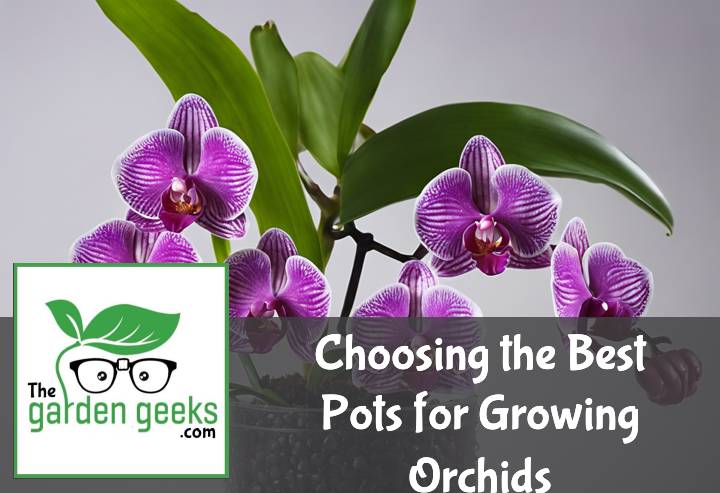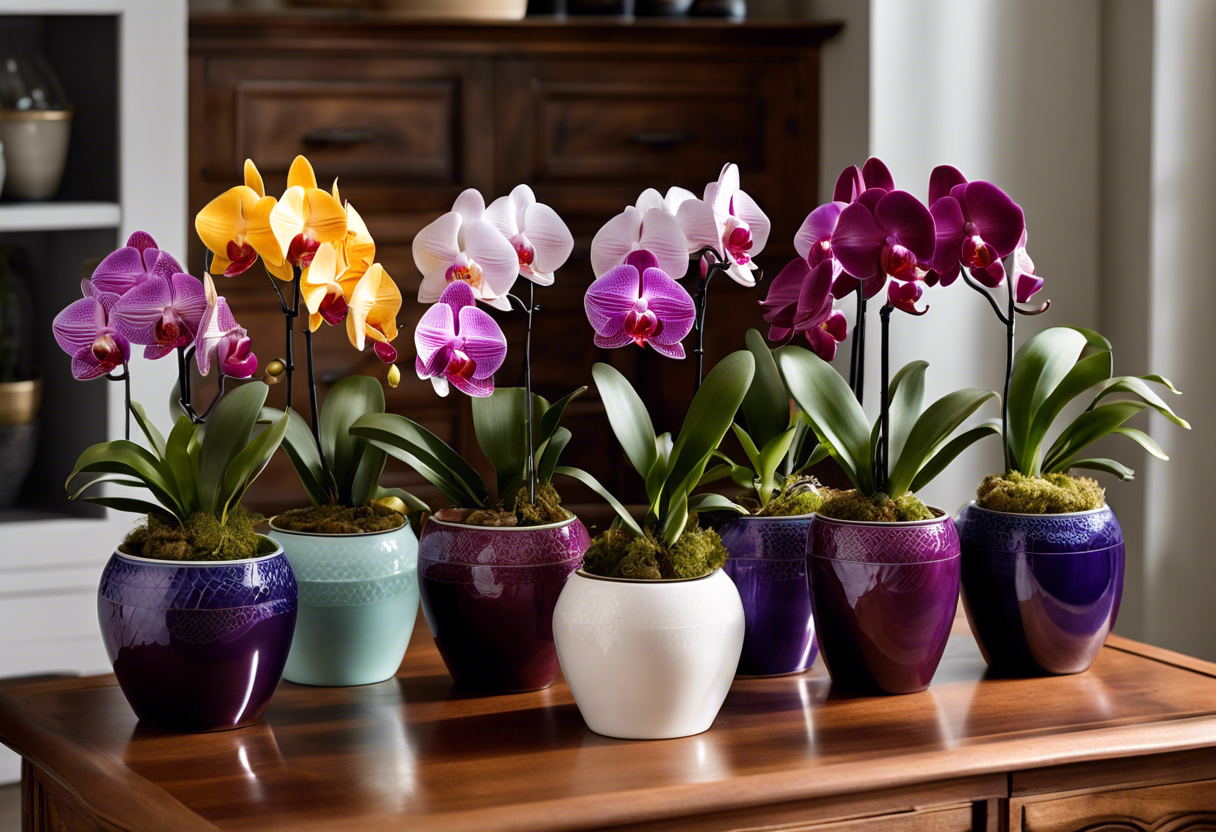Ever tried growing orchids and ended up with a wilted mess? Yep, been there, done that. The culprit might have been something as simple as the pot you used. Choosing the Best Pots for Growing Orchids is more than just picking the prettiest one off the shelf. It’s about understanding what your floral babies need.
So buckle up, green thumbs! We’re going on a deep dive into the world of orchid pots. By the end of this post, you’ll be an expert in choosing a home for your blooms that’ll make them thrive like never before. Keep reading about ‘Choosing the Best Pots for Growing Orchids (with Examples)’.
Key Takeaways
- Orchids thrive in pots that provide good drainage, such as those made of clay or plastic with multiple holes.
- Size matters: smaller orchids need smaller pots, while larger species require bigger containers.
- Clear plastic pots are ideal for beginners as they allow monitoring of root health and moisture levels.
- Specialty orchid pots, like slotted and net pots, offer excellent air circulation promoting healthy growth.
- Examples include the Mkono Plastic Orchid Pots, Meshpot Clear Plastic Orchid Pot, and the Sun Bulb Better-Gro Orchid Pot.
Why is Choosing the Right Pot Important for Growing Orchids?
Choosing the right pot isn’t just about aesthetics, it’s a crucial part of successful orchid cultivation. The pot you select can greatly impact on growth and overall health of your orchid. It’s not an overstatement to say that the importance of right pot selection is as vital as choosing the right type of orchid itself.
The Role of Pots in Orchid Growth
Pots play a significant role in orchid growth, more than you might think. They’re not just containers, they’re like mini ecosystems providing much-needed support for your orchids. But wait, there’s more! Pots also facilitate nutrient absorption, which is key to healthy and vibrant blooms.
Now, you might be thinking “Can’t any old pot do that?” Well, not exactly. Not all pots are created equal when it comes to supporting orchids. Some pots are better suited for this task than others, hence the need for careful selection.
Impact of Wrong Pot Selection on Orchid Health
So what happens if you choose the wrong pot? Well, let me tell ya, it ain’t pretty! A poor pot selection impact can have negative effects on your orchids’ health and development.
For instance, a too-small pot may restrict root growth while a too-large one may lead to waterlogging and root rot – both scenarios hindering their development. So remember folks, picking the best pots for growing orchids isn’t just about looks; it’s about ensuring your plants thrive!
Understanding Different Types of Orchid Pots
When it comes to growing orchids, the type of pot you choose can make a world of difference. Let’s dive into the unique characteristics of orchid pot types and how they affect your plant’s growth.
Plastic Pots
Plastic pots are like the Swiss Army knives in the world of best pots for orchids. They’re durable, lightweight, and offer excellent drainage – a big plus for those finicky orchid roots. However, they might not win any beauty contests and can become brittle over time. So, if you’re after longevity and aesthetics, plastic pots for orchids may not be your first pick.
Ceramic Pots
Next up on our pot parade are ceramic ones. These hefty guys are great at retaining moisture and provide good insulation for roots. Plus, their weight keeps top-heavy orchids from tipping over. But beware! Their weight can also be a drawback when it comes to moving them around. And let’s not forget about their potential to crack or chip. So while ceramic orchid pots have their benefits, they do come with some considerations.
Glass Pots
Some growers swear by glass pots for their see-through charm that allows a sneak peek at your orchid’s root health. But hold on there, Sherlock! Glass pots can be double-edged swords as they retain water longer (hello root rot!) and don’t offer much temperature control. So if you’re considering glass pots for orchids, remember to weigh the pros against the cons.
Wooden Baskets
Last but certainly not least are wooden baskets – the rustic choice for growing orchids! They give off a natural vibe that many growers love but watch out for potential rotting or need for liners. While wooden baskets for orchids have an undeniable charm, they require extra care compared to their plastic or ceramic counterparts.
Factors to Consider When Choosing a Pot for Your Orchids
When it comes to orchid pot selection, it’s not just about aesthetics. The best pots for growing orchids are those that cater to the plant’s unique needs. Let’s delve into some key factors like optimal pot size, effective drainage, durable pot materials, and orchid species compatibility.
Size of the Pot
The size of the orchid pot can significantly impact its growth. Too small, and your orchid might feel cramped. Too large, and it could drown in excess soil moisture.
Different types of orchids require different sizes of pots. For instance, smaller species like Phalaenopsis do well in compact pots while larger ones like Cymbidiums need more room to spread their roots.
Drainage Capabilities
Next up is drainage – an often overlooked but crucial aspect of orchid health. Good drainage prevents water from stagnating at the bottom of the pot which can lead to root rot.
A pot with effective drainage promotes healthy growth by ensuring that excess water doesn’t stick around longer than welcome. So when choosing a pot for your orchid, make sure it has ample holes at the bottom.
Material Durability
The material of your orchid pot matters too! Durable materials ensure longevity and provide a stable environment for your plants to thrive.
Plastic pots are lightweight and affordable but may not last as long as ceramic or clay ones which offer better insulation against temperature fluctuations. So choose wisely!
Compatibility with Orchid Species
Lastly, remember that each type of orchid has its own unique needs and characteristics. Some prefer tight spaces while others love roomy pots.
Certain materials may also be more suitable for specific species due to their moisture retention properties or breathability. Always consider these factors when choosing a pot for your beloved blooms!
Examples of Best Pots for Specific Types of Orchids
When it comes to orchid pot selection, one size doesn’t fit all. Different types of orchids, like Phalaenopsis, Dendrobium, and Cattleya, have unique needs that can be met with the right pot. Let’s dive into the world of best pots for growing orchids.
Best Pots for Phalaenopsis Orchids
Phalaenopsis orchids are the divas of the orchid family. They love their space and hate soggy roots. So, when considering ideal Phalaenopsis potting, think big and breathable.
Clear plastic pots are a popular choice because they let in light and allow you to keep an eye on root health. But remember, drainage is key! Overwatering is a surefire way to kill your plant baby faster than you can say “Phalaenopsis”.
So, look for pots with plenty of drainage holes to prevent water from pooling at the bottom. This will ensure optimal orchid growth and keep your Phalaenopsis happy.
Best Pots for Dendrobium Orchids
Dendrobiums are a bit more laid back but still have their quirks. They prefer snug quarters and excellent drainage to mimic their natural tree-dwelling habits.
Ceramic or clay pots are often recommended for perfect Dendrobium pots as they provide good airflow around the roots while also offering stability for these top-heavy plants.
Again, don’t forget about those drainage holes! A well-drained pot is essential to prevent root rot and keep your Dendrobium thriving.
Best Pots for Cattleya Orchids
Cattleya orchids are known as the ‘Queen of Orchids’ and they certainly live up to their regal reputation when it comes to potting requirements.
They prefer shallow pots that mimic their natural growing conditions on tree branches. Slotted or mesh pots are often the best Cattleya containers as they offer excellent ventilation and drainage.
Remember, size matters! A too-large pot can lead to overwatering and root rot. So, when it comes to Cattleyas, think small and breathable for optimal growth.
Common Mistakes to Avoid When Choosing an Orchid Pot
When it comes to selecting the best pots for growing orchids, there are a few common orchid pot mistakes that folks tend to make. These usually revolve around the size of the pot, its drainage capabilities, and the material it’s made from.
Overly Large or Small Pot Sizes
First off, let’s talk about size. You might think bigger is better when choosing orchid pots, but that’s not always the case. Picking a pot that’s too large can lead to overwatering since orchids don’t like having ‘wet feet’. On the flip side, going too small can cramp your orchid’s style (and roots), hindering its growth.
The key here is balance. You want a pot that gives your orchid room to grow but isn’t so big it feels like it’s swimming in a sea of soil. Remember, when it comes to orchid pot size, think Goldilocks – not too big, not too small, just right!
Inadequate Drainage Holes
Next up on our list of choosing orchid pots faux pas is skimping on drainage. Orchids aren’t fans of waterlogged roots; they need good airflow and excellent drainage to prevent root rot.
A pot without enough drainage holes can turn your beautiful plant into a soggy mess faster than you can say “root rot”. So when you’re picking out your next orchid home, make sure it has plenty of holes for water escape routes.
Wrong Material Choice
Lastly, we have material choice. Some folks get all caught up in how pretty a pot looks without considering if it’s actually suitable for their plant baby.
Certain materials may retain heat or fail at moisture control which could spell disaster for your precious green friend. So remember, while that shiny metal pot might look chic on your windowsill, it might not be the best pot for growing orchids.
Instead, opt for materials that provide good insulation and moisture control, like clay or ceramic. Your orchid will thank you for it!
To Wrap Up
Choosing the Best Pots for Growing Orchids is like picking a perfect home for a goldfish – it’s gotta be just right!
Remember, your orchids are divas and they need their space, so don’t cramp their style. Happy potting!





